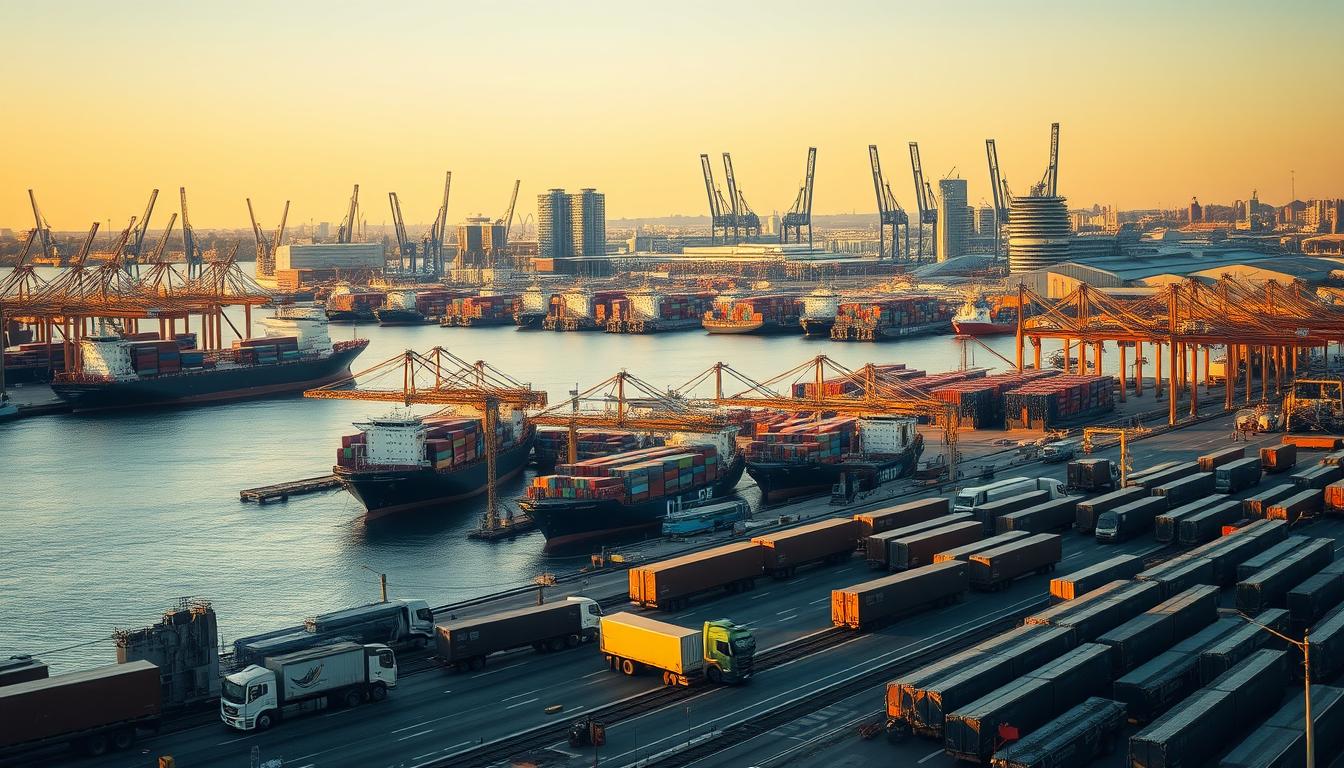In the world of import and export in Europe, there are many chances for businesses. They can explore the wide European trade scene. It’s important to know how international trade works, as it affects renting and buying in this market.
By learning about the basics and benefits of trading in Europe, we help businesses. We show them the ways to use their trading skills to their advantage.
Understanding the Import and Export Landscape in Europe
The import and export scene in Europe is complex. It’s influenced by many factors. Logistics in Europe and customs rules are key. These elements shape the trading world, affecting businesses that trade internationally.
Factors Influencing Trade Markets
Several important factors shape Europe’s trade markets. Economic conditions, political stability, and what consumers want all play a part. Advances in logistics help goods move smoothly, which is critical for trade.
Knowing these factors helps us make better choices about importing and exporting.
Key Differences Between European Countries
Trade practices and policies differ greatly across Europe. Cultural differences, rules, and access to markets vary. For example, Germany focuses on strict customs rules, while others are more flexible.
It’s vital to understand these differences to succeed in Europe’s import-export scene.
Common Import-Export Terms and Conditions
Knowing common import-export terms is key for those in international trade. Terms like “Incoterms” outline who does what in a deal. Grasping these terms helps avoid risks and follow customs rules, making trade smoother.
| Factor | Impact on Trade | Examples |
|---|---|---|
| Economic Conditions | Influences purchasing power and demand | Inflation rates, GDP growth |
| Political Stability | Affects confidence in markets | Government policies, trade agreements |
| Cultural Nuances | Shapes consumer preferences | Local tastes, branding approaches |
Steps to Successful Import and Export
Starting in international trade is thrilling but needs a smart plan. For those in the export-import field, knowing the process is key. This part covers important steps to get into markets and keep good relationships with European trading partners.
Identifying Market Opportunities
Our first step is deep market research. We need to check if there’s demand for our products in Europe. We look at what people like, prices, and cultural factors that affect buying. Knowing these helps us find the best chances for our business.
Developing a Trade Plan
A detailed trade plan is essential for success. It should outline our goals, like which markets to target and how to price our products. It also covers how we’ll get our products to customers and market them. A good plan helps us find the right partners in Europe and guides us in the fast-changing world of trade.
Navigating Legal Requirements
Following the law is a must in the export-import world. Each European country has its own rules for trade, like documents and licenses. It’s important to keep up with these laws to avoid problems. Knowing the rules helps protect our business and builds trust with our partners.
The Role of Customs in Import and Export
Knowing customs rules is key for those in international trade. These rules help goods move across borders legally and efficiently. For new traders, understanding customs can seem hard. But, learning about these processes helps us trade better and avoid problems.
Understanding Customs Procedures
Customs procedures are vital in international trade. They check and document goods moving in or out. Each country has its own rules, affecting trade speed and efficiency. Knowing these helps us avoid delays and follow the law.
Import Duties and Taxes
When trading abroad, we must know about import duties and taxes. These costs affect our prices and profits. Rates vary by country and good type, so research is key. This knowledge helps us stay competitive and follow local laws.
Customs Clearance Process
The customs clearance process has several steps for moving goods across borders. First, we give customs the needed documents like invoices and packing lists. After they check and accept these, we might need to pay duties and taxes. Once paid, we can move our goods to their final place. Knowing this process well makes trading smoother.
| Step | Description |
|---|---|
| 1. Documentation Submission | Provide necessary paperwork including invoices and packing lists. |
| 2. Assessment by Customs | Customs authorities review documents to ensure compliance with regulations. |
| 3. Payment of Duties and Taxes | Settlement of any import duties and taxes is required before clearance. |
| 4. Approval Confirmation | Upon successful completion, customs issues clearance for release of goods. |
| 5. Final Transportation | Goods can then be transported to their final destination. |
Popular European Countries for Import and Export
Trading in Europe can open up great chances for businesses wanting to grow. We’ll look at Germany, France, and the Netherlands. Each country has its own benefits, making them great for trade.
Germany: A Hub of Trade
Germany is Europe’s biggest economy, perfect for trading. It has a great logistics system, making moving goods easy. The country is also full of innovation, which is good for businesses in fields like engineering and cars.
This strong economy draws many trading partners. So, Germany is a top pick for new exporters.
France: Diverse Markets
France is famous for its wide range of markets, from fashion to food. It offers many chances for businesses to trade. France is also a key entry point to the European Union, helping companies reach more markets.
The country’s lively culture and big consumer base make it a key trade spot.
The Netherlands: Gateway to Europe
The Netherlands is key for trade in and out of Europe, thanks to its port at Rotterdam. It welcomes international business and has easy customs rules. The country’s logistics are top-notch, and it has a skilled workforce.
The Importance of Logistics in International Trade
Effective logistics in Europe is key to international trade success. Moving goods across borders needs a structured plan for timely delivery and cost savings. Choosing the right freight forwarder is critical for our trade operations. Understanding supply chain challenges helps us navigate the international market better.
Choosing the Right Freight Forwarder
Finding a reliable freight forwarder is vital for smooth logistics. The right partner makes moving goods easier, ensures rules are followed, and saves on shipping costs. When picking a freight forwarder, consider these factors:
- Experience in logistics in Europe
- Range of services offered
- Customer reviews and reputation
- Technology and tracking capabilities
- Pricing structure and transparency
Managing Supply Chain Challenges
Supply chain problems can come from delays, rule changes, and inefficiencies. To tackle these, we need strong strategies. Here are some ways to manage these challenges:
- Diversify suppliers to lower risks
- Keep clear communication channels
- Use technology for tracking
- Regularly check our logistics
- Stay updated on freight forwarding in Europe
Financing Your Import-Export Operations
Starting an import and export business needs a strong financial base. It’s hard to find the right funding and handle financial risks. Knowing about financial services is key to keeping up in the fast world of international trade. We’ll look at funding choices and how European banking helps our import-export plans.
Understanding Funding Options
Businesses in import and export have many funding options to keep cash flowing and grow. Here are some common ones:
- Bank Loans: Banks offer loans for starting new businesses or growing existing ones.
- Trade Finance: This includes services like letters of credit, which ensure payment to the seller when conditions are met.
- Factoring and Invoice Financing: These let businesses get cash now based on unpaid invoices.
- Equity Financing: Getting investors to share ownership can bring in a lot of money, great for big projects.
Managing Financial Risks
When looking at funding, it’s important to plan for financial risks in international trade. Here are some ways to manage them:
- Currency Hedging: Using financial tools to lessen currency risk can keep profits steady.
- Insurance: Good trade insurance can protect against losses from defaults and unexpected events.
- Risk Assessment: Keeping an eye on market conditions and who we’re dealing with helps make smart choices.
- Diversification: Investing in different markets can lower the risk of one market’s downturn.
Understanding Trade Regulations
In international trade, following customs rules is key for smooth operations. It’s vital for businesses to stick to EU rules when importing and exporting. Each European country has its own rules to keep the market fair. Knowing these rules helps us avoid problems in our trade work.
Compliance with EU Regulations
Following EU rules means knowing the trade laws of the market. These laws cover product standards, safety, and paperwork. Not following these can harm our business’s reputation and finances.
Impact of Breaching Trade Laws
Breaking trade laws can lead to big fines, delayed shipments, and lost licenses. These issues can mess up our supply chain and hurt our relationships. It’s important to keep up with customs rules for our business to thrive.
Networking in the International Trade Community
Getting involved in the international trade world is key for businesses looking to grow. Making connections with trading partners in Europe can really help. Trade fairs and expos are great for finding new partners and building strong relationships.
Participating in Trade Fairs and Expos
Trade fairs and expos are where businesses can show off what they offer. They bring together companies from all sorts of industries. This means lots of chances to meet new people and make connections.
- Access to informed insights about market trends and customer preferences.
- Opportunities to engage directly with trading partners in Europe.
- Ability to establish brand presence and credibility within specific industries.
Building Professional Relationships
Building strong professional ties is the foundation for good trade partnerships. It’s important to focus on shared goals and interests. Here are some tips for building these connections:
- Follow-up after initial meetings to express interest and maintain communication.
- Attend networking events regularly to keep relationships updated and engaged.
- Be open to collaborative projects that benefit both parties, boosting trust and teamwork.
Networking in the international trade world opens up new opportunities and strengthens current ones. By being active in trade fairs and focusing on building professional relationships, businesses can thrive in the fast-paced European trade scene.
Digital Transformation in International Trade
The world of international trade is changing fast. Businesses must adapt to succeed in the digital age. Digital transformation brings big benefits, like reaching more customers and working more efficiently.
Using e-commerce sites is key to growing our online presence. It helps us attract more customers from around the world.
Leveraging E-commerce Platforms
E-commerce platforms let businesses enter global markets easily. Sites like Shopify and Amazon make buying and selling smooth. They also help us get noticed by more people.
By optimising our product listings, we can find customers worldwide. This boosts our online presence.
Implementing Digital Marketing Strategies
Digital marketing is vital in today’s competitive world. SEO for WordPress helps us show up in search results. This brings more visitors to our sites.
Social media and content creation are also important. They help us connect with our audience and build loyalty. These efforts transform how we do international trade.
| Strategy | Description | Benefits |
|---|---|---|
| E-commerce Platforms | Online marketplaces that host goods and services | Wider reach, reduced overhead costs |
| SEO for WordPress | Optimising site content for search engines | Increased visibility, enhanced traffic |
| Social Media Marketing | Utilising platforms to promote goods | Direct engagement, brand awareness |
| Content Marketing | Creating valuable content for targeted audiences | Establishes authority, builds trust |
Challenges to Consider in Import-Export
In international trade, businesses face many challenges. Political and economic instability can change market conditions. It’s key to understand these factors for success in global trade.
Navigating Political and Economic Instability
Political changes and economic ups and downs can risk import-export activities. Trade policies, tariffs, and rules can shift suddenly. It’s vital for businesses to keep up with these changes in Europe.
In areas with unrest or economic troubles, companies need to adapt quickly. This might mean changing their strategies.
Adapting to Cultural Differences
Cultural differences are important in trading relationships. We must respect the unique communication styles, business manners, and consumer tastes in Europe. Understanding and valuing these differences can improve our negotiations and strengthen our partnerships.
| Challenge | Description | Potential Impact |
|---|---|---|
| Political Instability | Unexpected changes in government can disrupt trade agreements and policies. | Increased risks and costs in importing and exporting goods. |
| Economic Fluctuations | Currency volatility could affect pricing and profit margins. | Potential revenue loss and difficulty in maintaining competitive pricing. |
| Cultural Differences | Diverse customs and practices may lead to miscommunication. | Strained relationships and lost opportunities for collaboration. |
Export-Import Documentation
Understanding the export-import documentation is key for smooth international trade. Accurate paperwork is vital for following customs rules and making transactions easier. It covers the legal and practical sides of trade, preventing delays and fines.
Essential Paperwork for Trade
There are several important documents for successful trade:
- Commercial Invoice: This details the sale, including products, prices, and terms.
- Packing List: It lists the shipment’s contents, helping with inventory and customs checks.
- Bill of Lading: A carrier’s legal document confirming the shipment.
- Certificate of Origin: Shows where the goods were made, needed by customs.
- Import/Export Licenses: Required for certain goods to follow rules.
Keeping Compliant Records
Keeping accurate records is essential for international trade. We need to keep documents for efficiency and for customs audits. Remember these important points:
- All records must follow customs rules to avoid legal trouble.
- Keep documents for 3 to 5 years, as required.
- Use digital tools for easier record keeping and fewer mistakes.
Risk Management in Import-Export
In the world of international trade, knowing and managing risks is key. Different risks can harm our investments and how we work. We need to spot these risks to protect our interests well.
By creating strong plans to reduce risks, we can better face the unknowns in our field.
Identifying Possible Risks
Risks in import-export come from many places. These include economic changes, new rules, and global tensions. Some major risks are:
- Market Risks: Changes in demand or prices can hurt profits.
- Operational Risks: Problems with logistics in Europe can slow things down.
- Compliance Risks: Not following trade rules can lead to fines or penalties.
- Financial Risks: Fluctuations in exchange rates can change transaction costs.
Creating a Risk Mitigation Strategy
To tackle these risks, we can make a detailed plan. This plan should include:
- Risk Assessment: Carefully checking for risks in certain trade areas or markets.
- Insurance Coverage: Getting the right insurance for cargo and liabilities protects us from surprises.
- Supply Chain Diversification: Having many suppliers reduces our reliance on one source and lowers risks.
- Financial Planning: Working with financial experts to manage currency changes and cash flow.
By knowing these risks and making good plans, we can build a strong base for our import-export work. This helps us grow and succeed in a tough market.
| Type of Risk | Potential Impact | Mitigation Strategy |
|---|---|---|
| Market Risk | Decreased profit margins | Market trend analysis and diversification |
| Operational Risk | Delays and inefficiencies | Supplier evaluation and contingency planning |
| Compliance Risk | Legal penalties | Regular compliance audits and training |
| Financial Risk | Losses due to currency fluctuation | Financial hedging tactics |
Sustainability Considerations in International Trade
Looking into sustainability in international trade shows how important eco-friendly practices are. Companies in Europe are working hard to find ways that meet market needs and cut down on environmental harm. This shift is key to meeting global standards and encouraging more sustainability in the supply chain.
Eco-Friendly Transport Solutions
Transport is a big source of carbon emissions in international trade. We need to find eco-friendly transport solutions to lessen this problem. Here are some options:
- Using electric trucks for local deliveries.
- Adding biofuels and other green energies to ships.
- Choosing rail over road for some routes.
- Using different transport methods together to save fuel.
Building a Sustainable Supply Chain
For international trade to be sustainable, we must focus on building a strong supply chain. Important steps include:
- Working with suppliers who care about the environment and support green projects.
- Investing in tech that makes logistics more energy-efficient.
- Creating clear ways to track and lower environmental harm.
- Teaching employees why sustainability matters.
How LerriHost Can Assist You
In the world of import and export, businesses need special help to run smoothly. LerriHost offers a wide range of services to help companies grow in Europe. We help with setting up businesses and banking, making it easier to trade internationally.
Company Formation and Nominee Services
Our services make it easy for businesses to start in Europe. We take care of the hard parts, like setting up companies and partnerships. Our nominee services add privacy and meet legal needs, so you can focus on your business.
Financial and Banking Solutions
Getting the right banking services is key for import and export companies. We connect you with top banks for business accounts, payments, and currency exchange. Our big network makes it easy to handle money across borders.
SEO and Web Services for Import-Export Businesses
In today’s world, having a strong online presence is key for import-export businesses. The right strategies can boost visibility and draw in new clients. By using effective SEO for WordPress and matching our web services to industry standards, we can stand out online.
Importance of Online Presence
An effective online presence lets us share our unique offerings worldwide. It boosts brand recognition, builds trust, and helps us connect with new clients. With good SEO, our websites show up higher in search results, making it easier for others to find us.
WordPress Design and Maintenance
Using WordPress as our platform makes managing our online content easy and flexible. Keeping our site up to date is essential for its performance. Thoughtful design and regular updates help keep our site engaging and visible in search engines.
Contact Us for More Information
If you’re interested in the world of import and export in Europe, we’re here to assist. The world of international trade can be complex. We offer tailored insights and support to meet your specific needs.
Phone Number for Inquiries
Call us at 07538341308 for any questions about your import and export projects. Our team is ready to help. We aim to guide you through the changing trade landscape.
Let’s Discuss Your Import-Export Needs
We encourage you to talk to us about your import and export needs. Whether you’re experienced or new, we’re here to help. We provide the resources and knowledge you need to succeed in Europe.







